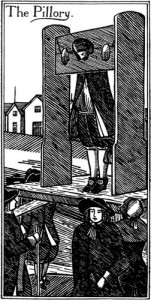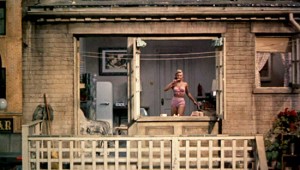 The publication of Jon Ronson’s So You’ve Been Publicly Shamed has triggered much discussion of the phenomenon of social-media “shaming,” most interestingly and convincingly by my friend Megan McArdle:
The publication of Jon Ronson’s So You’ve Been Publicly Shamed has triggered much discussion of the phenomenon of social-media “shaming,” most interestingly and convincingly by my friend Megan McArdle:
Twitter makes it absurdly easy to shame someone. You barely have to take 30 seconds out of your day to make an outraged comment that will please your friends and hurt the person you’ve targeted. This means it is also absurdly easy to attack someone unfairly, without pausing to think about context—or the effect you are having on another human being much like yourself. No matter what that person did, short of war crimes, you probably would not join a circle of thousands of people heaping abuse upon a lone target cowering in the center. But that is the real-world equivalent of what online shame-stormers do.
This sort of tactic may buy silence, though it is likely to be the most effective on people who already agree with you and simply said something infelicitous. What it cannot buy is community, beyond the bonds that build between people who are joined in collective hate….
If we want shaming to be restorative—to help us create and enforce better norms in a broad community—then it needs to come paired with charity and forgiveness. Shame-storms rarely offer either; the shame is administered, then the storm drizzles away, leaving only a terrified victim and Google’s memory of our momentary collective outrage.
To this I would add a personal footnote, which is that I never cease to be struck by the fact that so many people still fail to grasp that the social media are public. These technological innocents seem to think that you can use them to communicate exclusively with a small circle of friends—which is normally true. Yet the potential for attracting an infinitely wider audience is always there.
 It’s as if you were having sex in the living room of an apartment located on an upper story of a high-rise building. Should you opt to leave the curtains wide open, the chances are excellent that no one will see you, but all it takes is one troublemaker with a camera and a telephoto lens for you to find yourself on Twitter or Facebook, affording amusement (or edification) to the whole world.
It’s as if you were having sex in the living room of an apartment located on an upper story of a high-rise building. Should you opt to leave the curtains wide open, the chances are excellent that no one will see you, but all it takes is one troublemaker with a camera and a telephoto lens for you to find yourself on Twitter or Facebook, affording amusement (or edification) to the whole world.
Should unhappy shamees know better than to post the silly selfies and tasteless tweets that get them into trouble? Perhaps, but it’s too easy to answer yes. Twitter, after all, wasn’t created until 2006, and it took a fair amount of additional time for it to become a fully empowered agent of the secular arm of politico-personal correctness. We are still adjusting to that horrific development.
For my part, I use the social media fairly unselfconsciously. On the other hand, I don’t need to make a special point of weighing the possible unintended consequences of my tweets. I’d been a public figure of sorts for a quarter-century before Twitter was invented, and I made my public mistakes at a time when their consequences were comparatively insignificant. By the time I started writing regularly for the national media, I’d long since learned that there are things you simply don’t say in public, many of which would be innocuous in a better-regulated world but are nonetheless far more controversial than they really ought to be. In addition, I started blogging in 2003, three years before Twitter came along and sufficiently ahead of the curve to permit me to fully internalize the inescapable but easily forgotten fact that you own everything you post on the social media, now and forevermore.
 If it sounds like I’m a dedicated practitioner of what is known in Nineteen Eighty-Four as crimestop, I can only reply that we now live in an Orwellian world, complete with an increasingly generous allotment of Twitter-enabled two-minute hates. At the same time, though, I’m also old-fashioned enough to believe in the absolute necessity for a truly private life. I talk about a lot of things on the social media, but I draw a bright line between that which I regard as appropriate for public discussion and that which is nobody’s business but my own. (I speak, incidentally, as one who has never taken a selfie and has no plans to do so.)
If it sounds like I’m a dedicated practitioner of what is known in Nineteen Eighty-Four as crimestop, I can only reply that we now live in an Orwellian world, complete with an increasingly generous allotment of Twitter-enabled two-minute hates. At the same time, though, I’m also old-fashioned enough to believe in the absolute necessity for a truly private life. I talk about a lot of things on the social media, but I draw a bright line between that which I regard as appropriate for public discussion and that which is nobody’s business but my own. (I speak, incidentally, as one who has never taken a selfie and has no plans to do so.)
Many people, of course, beg to differ, and that’s as much their business as mine is mine. It’s the unfortunate folk situated in between those extremes who fall victim to their own imprudence, not the knowing exhibitionists who disbelieve devoutly in the notion of Too Much Information.
No doubt a time will come when we’ve all learned to watch our electronic mouths. Until then, I can only offer the same advice that I gave many years ago to a then-obscure performer about whom I wrote a profile that helped to put her on the road to fame. When I interviewed her for the piece—on tape, mind you—she said a number of things that would have caused her embarrassment had I quoted her. I liked her and admired her artistry, so at the end of the interview, I said, “Can I give you a piece of advice? Journalists are not your friends. Most of them would have printed what you said without a second thought. I won’t, but I want you to remember something for as long as you live: no matter how nice a reporter may seem, you must always treat each interview as an adversary proceeding.”
That’s how the social media work, too. Use them prudently and they can be a source of enormous pleasure and profit, but never forget that the sharks of cyberspace lie in wait to bite your hand off. They don’t care about you. In fact, you don’t even exist to them, save as an abstract symbol of their preferred causes. What they want, ever and always, is power, and they’ll happily eat you in order to get more of it. If you’re not prepared to bite back—hard—then stay out of the deep end.
